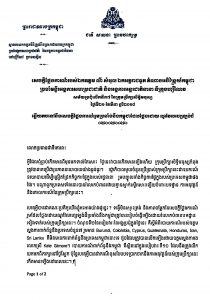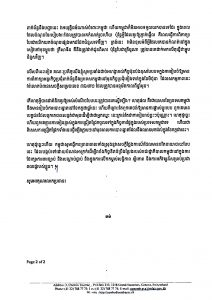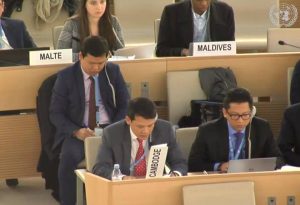Op-Ed: Geneva Switzerland
Item 2 General Debate
37th Session of the Human Rights Council
Geneva, March 21, 2018
Mr. President,
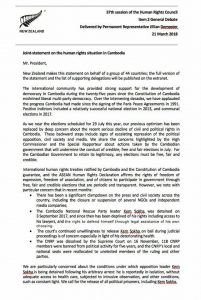 New Zealand makes this statement on behalf of a group of 45 countries; the full version of the statement and the list of supporting delegations will be published on the extranet.
New Zealand makes this statement on behalf of a group of 45 countries; the full version of the statement and the list of supporting delegations will be published on the extranet.
The international community has provided strong support for the development of democracy in Cambodia during the twenty-five years since the Constitution of Cambodia enshrined liberal multi-party democracy. Over the intervening decades, we have applauded the progress Cambodia had made since the signing of the Paris Peace Agreements in 1991. Positive indictors included a relatively successful national election in 2013, and communal elections in 2017.
As we near the elections scheduled for 29 July this year, our previous optimism has been replaced by deep concern about the recent serious decline of civil and political rights in Cambodia. These backward steps include signs of escalating repression of the political opposition, civil society and media. We share the concerns highlighted by the High Commissioner and the Special Rapporteur about actions taken by the Cambodian government that will undermine the conduct of credible, free and fair elections in July. For the Cambodian Government to retain its legitimacy, any elections must be free, fair and credible.
International human rights treaties ratified by Cambodia and the Constitution of Cambodia guarantee, and the ASEAN Human Rights Declaration affirms the rights of freedom of expression, freedom of association, and of citizens to participate in government through free, fair and credible elections that are periodic and transparent. However, we note with particular concern that in recent months: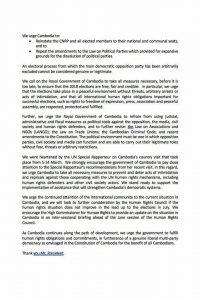
- There has been a significant clampdown on the press and civil society across the country, including the closure or suspension of several NGOs and independent media companies;
- The Cambodia National Rescue Party leader Kem Sokha was detained on 3 September 2017, and since then has been deprived of his rights including access to his lawyers, and the right to defend himself through legal assistance of his own choosing.
- The court’s continued unwillingness to release Kem Sokha on bail during judicial proceedings is of concern especially in light of his deteriorating health.
- The CNRP was dissolved by the Supreme Court on 16 November, 118 CNRP members were banned from political activity for five years, and the CNRP’s local and national seats were reallocated to unelected members of the ruling and other parties.
We are particularly concerned about the conditions under which opposition leader Kem Sokha is being detained following his arbitrary arrest: he is reportedly in isolation, without adequate access to health care, subjected to intrusive observation, and other conditions, such as constant light. We call for the immediate release of all political prisoners, including Kem Sokha.
We urge Cambodia to:
- Reinstate the CNRP and all elected members to their national and communal seats, and to
- Repeal the amendments to the Law on Political Parties which provided for expansive grounds for the dissolution of political parties.
An electoral process from which the main democratic opposition party has been arbitrarily excluded cannot be considered genuine or legitimate.
We call on the Royal Government of Cambodia to take all measures necessary, before it is too late, to ensure that the 2018 elections are free, fair and credible. In particular, we urge that the elections take place in a peaceful environment without threats, arbitrary arrests or acts of intimidation, and that all international human rights obligations important for successful elections, such as rights to freedom of expression, press, association and peaceful assembly, are respected, protected and fulfilled.
Further, we urge the Royal Government of Cambodia to refrain from using judicial, administrative and fiscal measures as political tools against the opposition, the media, civil society and human rights defenders and to further revise: the Law on Associations and NGOs (LANGO); the Law on Trade Unions; the Cambodian Criminal Code; and recent amendments to the Constitution. The political environment must be one in which opposition parties, civil society and media can function are able to carry out their legitimate roles without fear, threats or arbitrary restrictions.
We were heartened by the UN Special Rapporteur on Cambodia’s country visit that took place from 5-14 March. We strongly encourage the government of Cambodia to pay close attention to the Special Rapporteur’s recommendations from her recent visit. In this regard, we urge Cambodia to take all necessary measures to prevent and deter acts of intimidate and reprisals against those cooperating with the UN human rights mechanisms, including human rights defenders and other civil society actors. We stand ready to support the implementation of assistance that will strengthen Cambodia’s democratic systems.
We urge the continued attention of the international community to the current situation in Cambodia, and we will look to further consideration by the Human Rights Council if the human rights situation does not improve in the lead up to the elections in July. We encourage the High Commissioner for Human Rights to provide an update on the situation in Cambodia in an inter-sessional briefing ahead of the June session of the Human Rights Council.
As Cambodia continues along the path of development, we urge the government to fulfill human rights obligations and commitments, in furtherance of a genuine liberal multi-party democracy as envisaged in the Constitution of Cambodia for the benefit of all Cambodians.
Thank you Mr. President.
More report by Reuters

